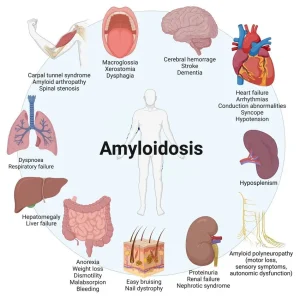Overview
Diagnosis of Amyloidosis
Amyloidosis occurs when abnormal protein deposits (amyloid) build up in organs, affecting their function. Diagnosis involves:
-
Medical history and physical exam: Symptoms vary depending on affected organs (heart, kidneys, liver, nerves).
-
Blood and urine tests: Measure abnormal proteins or light chains in blood or urine.
-
Imaging tests: Echocardiogram, MRI, or other imaging to evaluate organ involvement.
-
Biopsy: Tissue samples from affected organs or fat pad aspiration confirm amyloid deposits under a microscope.
Treatment of Amyloidosis
Treatment focuses on reducing amyloid production and managing organ damage:
-
Medications: Chemotherapy-like drugs for light-chain (AL) amyloidosis or targeted therapy for hereditary forms.
-
Supportive care: Treating heart, kidney, or nerve complications.
-
Stem cell transplant: For selected patients with AL amyloidosis to suppress abnormal plasma cells.
Key Takeaways
-
Amyloidosis can affect multiple organs, requiring individualized treatment.
-
Early diagnosis and therapy can slow disease progression.
-
Supportive care is essential for maintaining organ function.
Advertisement

